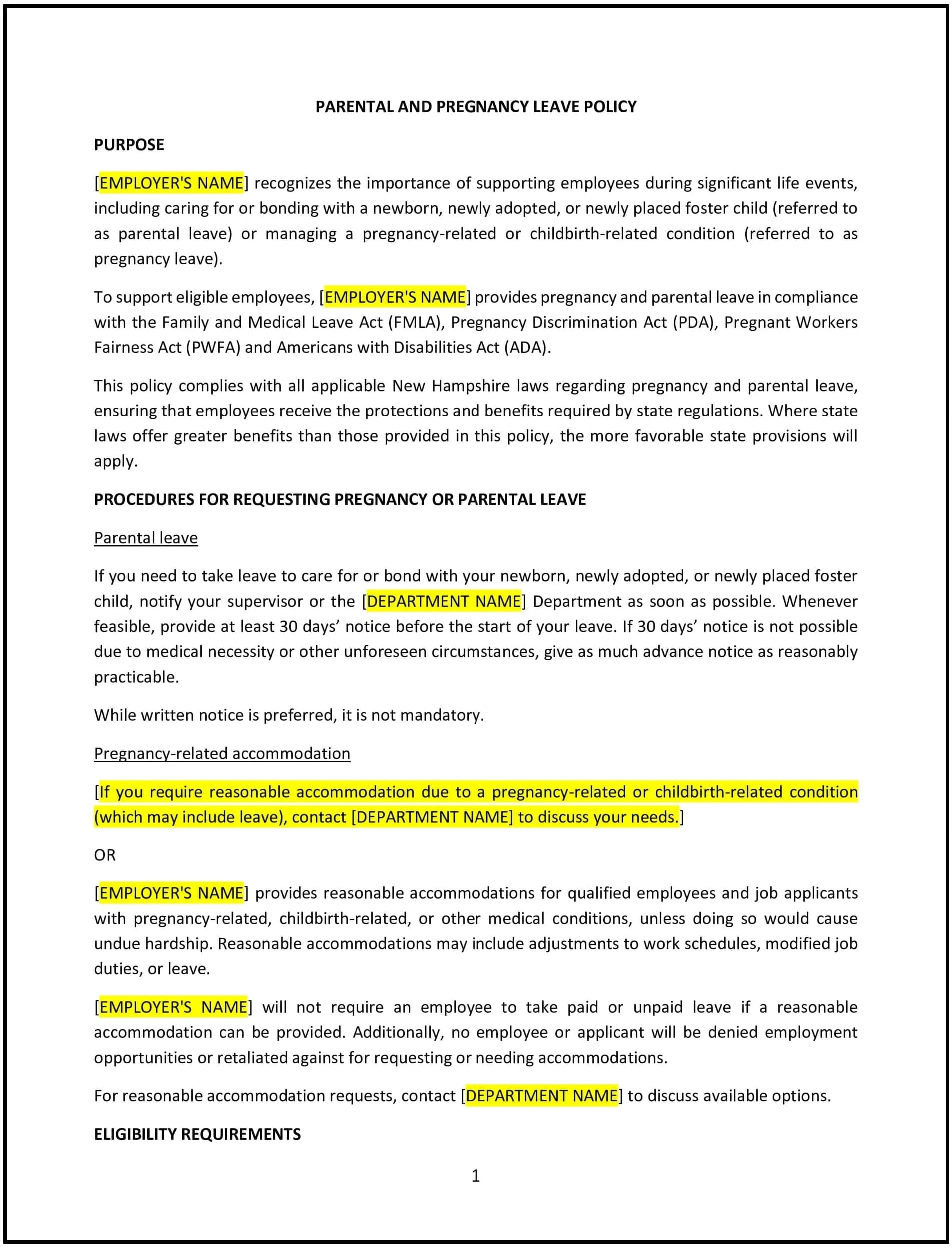Parental and pregnancy leave policy (New Hampshire): Free template
Got contracts to review? While you're here for policies, let Cobrief make contract review effortless—start your free review now.

Customize this template for free
Parental and pregnancy leave policy (New Hampshire)
A parental and pregnancy leave policy helps New Hampshire businesses support employees during pregnancy, childbirth, and the early stages of parenthood. This policy outlines the company’s approach to parental and pregnancy leave, including eligibility, leave duration, and any benefits provided during the leave period. It ensures that employees are treated fairly and respectfully during a major life event, while also helping businesses manage staffing needs.
By implementing this policy, businesses can demonstrate their commitment to work-life balance, support gender equality, and provide employees with the resources they need during pregnancy and parental leave.
How to use this parental and pregnancy leave policy (New Hampshire)
- Define eligibility: Specify which employees are eligible for parental and pregnancy leave, including full-time and part-time employees, and the duration of their employment required to qualify for leave.
- Outline leave entitlements: Clearly state the amount of leave employees are entitled to, including any paid and unpaid leave options available, as well as the process for requesting leave.
- Address job protection: Ensure that employees on parental or pregnancy leave are entitled to return to their previous position or an equivalent position with the same salary and benefits.
- Discuss benefits during leave: Explain how employee benefits, such as health insurance or retirement contributions, will be handled during parental and pregnancy leave, including whether these benefits will continue during the leave period.
- Provide guidelines for leave requests: Set clear guidelines for how employees should request parental or pregnancy leave, including the required notice period and any supporting documentation (e.g., medical certificates, birth certificates).
- Address accommodations during pregnancy: Provide guidelines for making reasonable accommodations for employees who are pregnant, such as adjusting work schedules or providing modified duties if necessary.
- Review and update: Regularly review and update the policy to ensure it remains in line with any changes to state or federal law, as well as evolving company needs.
Benefits of using this parental and pregnancy leave policy (New Hampshire)
This policy provides several benefits for New Hampshire businesses:
- Supports employee well-being: By offering parental and pregnancy leave, businesses provide essential support to employees during significant life events, ensuring they can take time off to focus on their health or family.
- Demonstrates commitment to gender equality: Offering parental leave for all employees, regardless of gender, reflects a commitment to equality and fairness in the workplace.
- Reduces employee turnover: Providing parental and pregnancy leave helps retain experienced employees who may otherwise leave the workforce, leading to reduced turnover and recruitment costs.
- Maintains productivity: By planning for parental leave and having clear guidelines, businesses can ensure that staffing needs are managed efficiently during employee absences, minimizing disruptions to operations.
- Enhances company reputation: A comprehensive parental and pregnancy leave policy can improve the company’s reputation as an employer of choice, attracting top talent and improving employee morale.
Tips for using this parental and pregnancy leave policy (New Hampshire)
- Communicate the policy clearly: Ensure all employees are aware of the company’s parental and pregnancy leave policy, especially new hires, so they understand their rights and entitlements from the start.
- Plan ahead for leave: Encourage employees to provide as much notice as possible when requesting parental or pregnancy leave, allowing the business to plan for staffing needs and minimize disruptions.
- Provide flexible accommodations: Where possible, offer flexible working arrangements or accommodations for pregnant employees to ensure they are comfortable and able to continue working during pregnancy.
- Stay informed about changes in law: Keep up to date with any changes to federal or state laws related to parental and pregnancy leave, and adjust the policy as needed to ensure compliance with legal requirements.
- Offer support during the transition: Provide support to employees returning from leave, including offering flexibility to ease their transition back into work and ensuring they feel welcomed and valued upon their return.